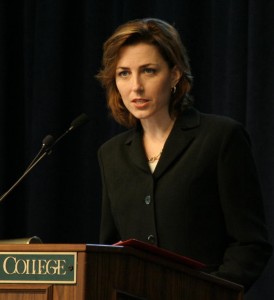
Returning my gaze to the bleak scene beneath my window, I realized how much things had changed–how much I had changed–since I first arrived at my freshman dorm that muggy August move-in day.
From this starting point Colleen beautifully narrates a story of her personal quest to understand the meaning of life in the light of her Catholic background and evolving personal faith. She had embraced contemporary feminism, as well as the party life, she found at Marquette University. Throwing her mind and heart into the university scene she soon reached the place where faith called out to her deepest inner being. She felt no one was home. The lengthy quote I shared above is but one example of how she reflected upon where she was during her college years in Milwaukee. What follows this starting point is a beautifully written spiritual memoir of an amazingly modern, but deeply ancient, journey to Jesus. She begins the first sentence of her book–”A Note to the Reader”–with this simple description of what the reader is going to encounter by reading her book: “This is the story of a journey, a personal search for insight and peace that began with that age-old, seductively simple question: Is this all there is?” (ix). Midway through her college years Colleen began what she describes as a fifteen-year quest, a quest that began at a boisterous college party and eventually led her to Lourdes, the ruins of Auschwitz, the papal palace and the oval office. (She was a speech writer for President George W. Bush.) She tells how she wrestled with all the problems that a young adult deals with who embraces the secular college scene in the midst of incredible personal and peer pressure. She movingly, but never graphically, tells of her own experience of the sexual chaos of what is called the hookup culture. She writes powerfully of the tensions she experienced between her dueling desires for professional success (especially after she landed the job in the oval office while still a young woman) and a life of committed marital love. She relates her struggles about having a deep ambivalence regarding the demands of marriage and parenthood. She also provides one of the most moving accounts of a daughter sharing in her father’s descent into dementia and death I’ve ever read. Honestly, this is one of the most sensitive accounts of such pain you will ever read. She says, “Dissatisfied with the pat answers offered by both secular feminists and their antifeminist critics, I found grace and inspiration from an unexpected source: spiritual friendships with six women saints” (x, italics mine). It was this sentence that drew me into her new book when I picked it up at my local library. I am neither a woman nor a devout Roman Catholic but I enjoy reading contemporary memoirs by women who are deeply Catholic. I am also a mild egalitarian who appreciates many of the gains of modern feminism while rejecting the sharper ideological edges which I think tend to deny both the orthodox faith and sheer common sense. Colleen Carroll Campbell asks–and then offers what I believe to be a compelling answer–the nagging question that so many women have asked in the last forty years or so:
What is the source of that gnawing sensation inside me, and why does my pursuit of pleasure and success only intensify it? Is it true that there is no real difference between the sexes, or does my femininity–and female body–have something to do with my desires and discontent? If the key to my fulfillment as a woman lies in maximizing my sexual allure, racking up professional accomplishments, and indulging my appetites while avoiding commitment, why has following that advice left me dissatisfied? Why do my friends and I spend so many hours fretting that we are not thin enough, not successful enough, simply not enough? If this is liberation, why am I so miserable (5)?
Colleen writes that in the very air that she breathed, growing up in the 1970s and 1980s, and coming of age in the 1990s in college, she never questioned much of the reigning philosophy of the time at any level of depth. In college she took hr first course on feminism. A question then haunted her to her core: “What makes a woman distinct from a man and how [can] a woman find freedom and fulfillment?” (5). (I will come back to this question several times this week in my series on this new memoir.) She writes, “I knew that feminism came in many forms” (6). She is grateful for some of these forms and openly expresses why she believes these impressive and important gains are very positive. But she takes dead aim at what she calls the “shrill and hyperbolic . . . denunciations” of so much radical feminism. She examines Simone de Beauvoir, Betty Friedan and other secular feminist thinkers.
The real answers Colleen sought did not begin until she dragged her graduate student boyfriend to a Sunday night Mass. At this point in her life having a boyfriend was new for Colleen. Her last “boyfriend” relationship had been during her freshman year. But attending Mass with a boyfriend was an entirely new experience. She had walked away from all the “boredom” of church and embraced her secular views on just about everything.. Now, here in the Mass, things began to change. She writes that her boyfriend, like most of her college peers at Catholic Marquette, was only a nominal Catholic who lived as a “practical atheist” (8). That evening she stood at the back of an old Gothic sanctuary and wondered if the “aching feeling in the pit of my stomach” was a “lingering melancholy” about the loss of all intimacy with God, the God who she had almost completely abandoned back in her freshman year (8). For three years she had given God “the scraps of [her] time and attention” (9). As she walked out of church that evening she told her boyfriend that she had to go back in for a time to be alone. Through her tears she entered and began to pray: “I want you, Lord. I want to know you. I know there’s more to life than this. There’s more to you than this. There must be. But you have to show me. I’m opening my eyes, finally, but you have to show yourself to me” (9-10). 
Related Posts
Comments
My Latest Book!

Use Promo code UNITY for 40% discount!






Excellent review John!
I love that you introduce me to writers that I don’t know about on my own. Thanks, John.
Sandy Crown Brinks liked this on Facebook.
Richard Carrington liked this on Facebook.
Ed Holm liked this on Facebook.
Nice review in articulating her journey back to Christ. Cc: Christy, Christine, Elena, Angie, Jenny, Rosalba,
Ben Toh liked this on Facebook.
Denise Murphy Plichta liked this on Facebook.
Keep reading all week, please.
I am getting that book! My Kindle leads me into temptation sometimes, but often in a good direction.